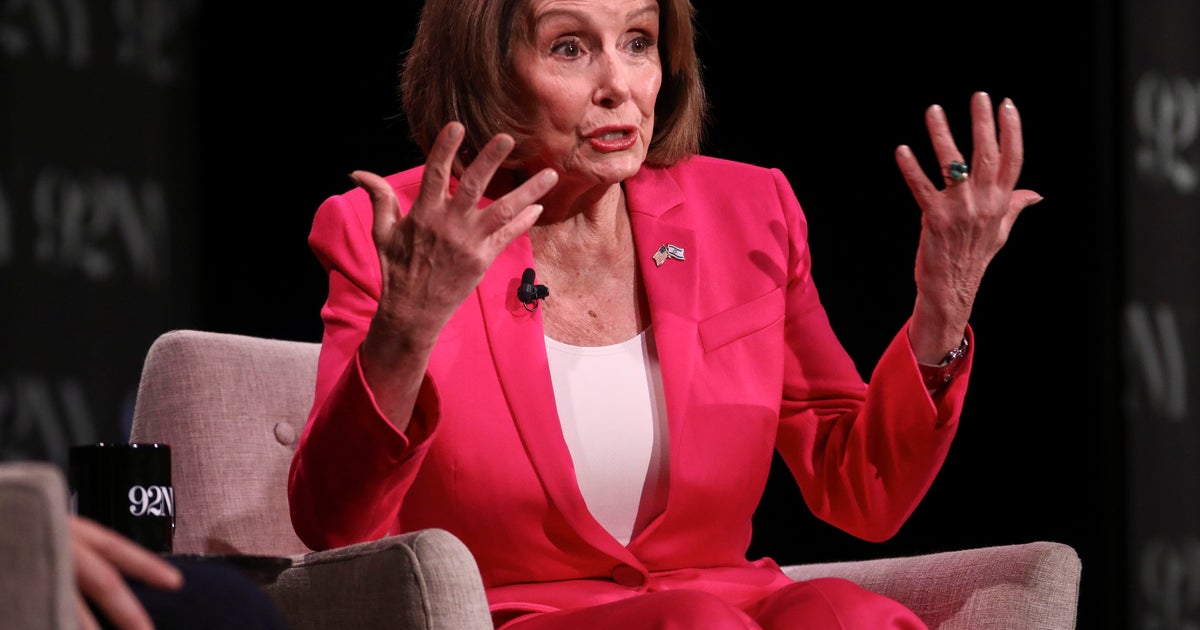ICYMI: Top takeaways from this week's "Face the Nation": Lawmakers spar over coronavirus aid
This week on "Face the Nation", 100 days from the election, the coronavirus surges in the south and west, with hospitalizations and deaths on the rise. Unemployment claims spike for the first time in nearly four months, and President Trump looks for a reset.
Here's the big takeaways from Sunday's episode of "Face the Nation"
1. Pelosi on COVID-19 relief: We "can't go home" without it
- House Speaker Nancy Pelosi said that Congress cannot go home to their districts next month without first passing a relief bill. "We can't go home without it," she said in reference to providing an extension to the federal boost to unemployment insurance. The White House and Senate Republicans are proposing slicing the $600 a week boost down to 70% of prior wages. Currently 31 million Americans have filed for jobless benefits. The Speaker dismissed the idea of a reduction.
- What Pelosi said: "The reason we had $600 was its simplicity. And figuring out 70 percent of somebodies wages. People don't all make a salary. Maybe they do. They make wages and they sometimes have it vary. So why don't we just keep it simple? Unemployment benefits and the enhancement, which is so essential right now and that's really where we are starting and it's so important to the American people."
- Why it matters: As we said during the program, "for everyday Americans who are waiting on this money, the amount matters." There's an argument that this is a cliff and that people were paid to stay home. Now, they don't need to be paid to stay home.
2. Cruz not on board with current Republican COVID relief proposal
- Senate Republicans were unable to unite behind a bill before the ban on evictions and the federal unemployment aid boost expired on Friday. Senator Ted Cruz of Texas opposed Leader McConnell's proposal, which included extending unemployment aid but at a reduced amount. Leader McConnell is expected to unveil details of the Republican proposal on Monday. Cruz told "Face the Nation" he wants a bill to lower taxes and still opposes McConnell's efforts.
- What Cruz said: "The policy that Nancy Pelosi and the Democrats are pushing adds an additional $600 a week of federal money to unemployment. We have the unemployment system, the system we have had...Except, the problem is, for 68% of people receiving it right now, they are being paid more on unemployment than they made in their job. And I'll tell you, I've spoken to small business owners all over the state of Texas who are trying to reopen and they're calling their- their waiters and waitresses,--they're calling their busboys, and they won't come back. And, of course, they won't come back because the federal government is paying them, in some instances, twice as much money to stay home as-"
- Why it Matters: Time has run out to bring a fresh wave of aid to Americans who are depending on it. While the Senator told "Face the Nation" the country is confronting two crises simultaneously: a global pandemic and an "absolute economic catastrophe."
- Yet Cruz accused House Speaker Nancy Pelosi and Democrats of pushing a coronavirus relief package that focuses on "shoveling cash at the problem and shutting America down" as negotiations on the next measure continue.
3. Azar: Each community will have to evaluate own "circumstances" for reopening schools
- Health and Human Services Secretary Alex Azar provided no explanation as to why President Trump tried to block Republicans from including more money for testing in their upcoming bill. Azar suggested the opposition was dropped in saying that he'll work with Congress on "adequate funding for testing." While Senate Democrats and Republicans have complained that HHS is sitting on already allocated funds rather than disbursing them to places in needed, Azar instead passed along blame to Governors for not spending it
- What Azar said: "We have $11 billion that we have pumped out to the states that they are not yet using. You know, our public health labs are running at 58% of their capacity even though we have the supplies to support them fully. We've got to get full shift work into those so we increase the capacities there."
- On School reopenings: HHS and CDC provided guidelines on reopening schools this week but declined to stipulate when it is safe to do so. In a "Face the Nation" twitter chat earlier this week Surgeon General Jerome Adams said there is no "hard cutoff" but it would be preferable for positivity rates to be less than 10% in a community. Azar refused to provide any guidance. I asked him if a hotspot, a community with a positivity rate of 5% or above, should keep schools open.
- "Each community is going to have to make the determination about the circumstances for reopening and what steps they take for reopening, but the presumption should be we get our kids back to school and we figure out how to make that happen," Azar said.
- Why it matters: As epicenters shift around the country, the back-to-school experience may look different for different communities and for age groups within those communities.
4. Dr. Scott Gotttlieb: Uncontrolled community spread makes it "very hard to open" schools in fall
- Former FDA Commissioner Scott Gottlieb did provide his medical opinion and policy guidance on when it a school should reopen or stay closed. He is advising the Governors of Maryland and Massachusetts.
- What we asked: If you see a positivity rate above 5%, which is hotspot territory, do you send your kid to school?
- What Gottlieb said: I think somewhere in five to 10% it's starting to get iffy. Above 10% I think that's a threshold where you really want to think carefully about closing the school districts, because that is a sign that there is an epidemic underway inside that community.
- Another key recommendation: Gottlieb said that testing needs to be fixed before schools reopen.
- "I think one of the things you need to look at in a local community is whether or not you can get test results, because if you can't get test results back in a timely fashion, you really don't have a way to detect whether there is an outbreak in the community or in the school. And while we do need to lean forward and try to open our schools because it's important to children, we need to prevent outbreaks from happening in the schools. We can't just let the infection run rampant inside the schools. And having good testing in place is going to be a critical tool. I talked to the CEO of LabCorp yesterday. They've gotten caught up. They're doing about 175,000 tests a week. They're going to be returning test results maybe within two or three days right now. Hopefully, Quest will get caught up as well. But if we do have other major epidemics, other major hotspots emerge, the testing system can become strained again. We're heading towards about 750,000 tests a day and will probably be at a million by the end of this month. So we have a lot of testing capacity. The problem is when you have these major epidemics in multiple regions of the country, it can strain the system."
- Why it matters: Without explicit guidelines on when schools should close due to a potential coronavirus outbreak, parents and school administrators are left filling the gap for the administration's top medical minds in keeping their children safe.
5. Woods: National registry needed for COVID testing supplies
- Atrium Health CEO Eugene Woods has medical facilities in the Carolinas and Georgia. He said that COVID-19 testing results are delayed due to shortages of reagents to process the tests. Woods asked Congress last week to get the federal government to help create a national registry to distribute supplies to hot spots around the country. Woods also said he appealed to have health care workers be at the front of the line once a COVID-19 vaccine is approved.
- What Woods said: "Yes, we have asked that health care workers throughout the country, especially in the hot spot areas, be- be- be at the front of the line together with essential workers, including teachers and- and so forth. So we've already made that- that request. The challenge, and I shared this with the- the Senate committee is that, you know, even when we have the flu, a flu season, 40% of Americans say they're not going to get vaccinated. And so what you heard in my testimony was that I do think we need to launch a national campaign, national PSA that really talks about the benefits of vaccination."
- What it matters: A national registry could play the role of oversight in a constantly evolving pandemic that is lacking at the moment. As hospitals change their need -- more patients vs less -- so too should testing and medical supplies to combat the ongoing epidemic.
ICYMI: 100 days to go: Biden leads in key state of Michigan
- Yes, there's an election still happening, and it's getting closer every week. CBS News' latest Battleground Tracker looked at national trends and the presidential race in two Midwestern states, Ohio and Michigan. President Trump won both in 2016 and our results today show Ohio is competitive.
- What the polls show: President Trump is up 46 to Biden's 45. But in Michigan, former Vice President Joe Biden leads. He's up 48 to 42.
- Why it matters, from Salvanto and the team: Some elections are just about "the economy," but despite the downturn, 2020 is about much more; there's just too much else happening. And while there's no big edge for either President Trump or former Vice President Joe Biden regarding who can revive the nation's economic fortunes, we do see glaring divisions over the matters shaping the nation's cultural and race relations and public health, all of which are strongly tied to vote, and which as of now accrue to Joe Biden's advantage.
- Read more of their latest polling here
Missed Sunday's episode? Click here to watch the show. "Face the Nation" airs Sunday mornings on CBS. Click here for local listings.




